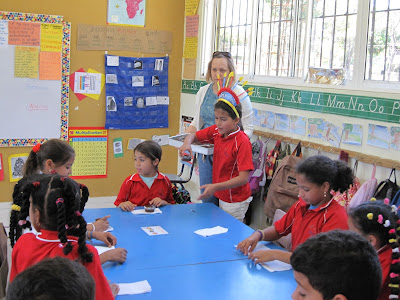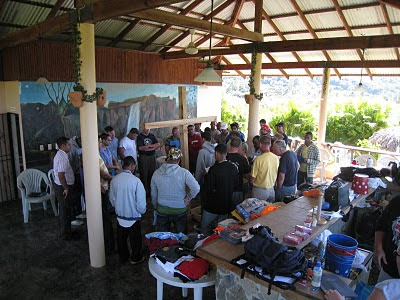A record of our adventures in the Dominican Republic. We are Rick and Becky Mackey serving with Mesa Global. Our work focuses on helping new church plants become established and ready to plant new churches in places where there are none.
Wednesday, November 23, 2011
Bibles given in Los Calabazos
Thursday, November 17, 2011
Building Families in Boma
Tuesday, November 01, 2011
Building Bathrooms!
Church members worked alongside the team. They have continued the work since the team left. Pictured above are the new bathrooms just after the ceiling was poured. In future weeks, the building will be skim coated, the floor will be poured and the fixtures installed.
Beyond construction, the team shared testimonies in services. One special night was when they attended the church service in El Montaña. They were able to share with the church a little of its history. 20 years earlier, Calvary EFC had sent a team and they built the church building. Some of the adults leaders in the church remember it. They were children at the time and they helped in the construction and attended Vacation Bible School. The team also visited homes. One woman attended Bible studies with Becky. They also brought many needed supplies. Some will be used in Buenos Aires and some in the other church plants. At times in the evening, they met with Dominicans friends and were able to catch up. Many on the team had been before and had friends they hoped to see from their past trips.
God has used Calvary EFC in significant ways. And while many of the teams "projects" have been in the area of construction, they have always been about ministering to people through relationships. They were a great blessing to us and to our churches. We praise God for them and our relationship with them.
Monday, October 03, 2011
Santo Cerro & Christopher Columbus' Fort
Unfortunately, there isn't a lot left of this fort. Time has done it's damage. Earthquakes have added to that. And at one point, they were taking block from the fort to use in the construction in present day La Vega.
Excavation and restoration of the ruins began in 1976 and today, the ruins are located in a national park. There is still more to be done, but it appeared that all work has stopped for now.
Ben enjoyed climbing all over and exploring the ruins.
Friday, September 16, 2011
Campesinos Wear Boots
As she was walking away to go through security, a Dominican man pointed to her and said, "Look at that girl in boots! Why is she wearying those boots?"
So I said, "That's my niece, she bought them here. She lives in the country in New York and her old pair are worn out."
He said, "She lives in New York?"
"Yes, in the Adirondaks, the mountains in northern New York."
"There are mountains in New York?"
"Yeah, not in the City, but north," I explained. Many Dominicans think of New York as just the City of New York.
"Really?? Does she know the kind of people who wear those boots here?"
"Yes, campesinos (hillbillies)"
He laughed and said, "Yeah, hillbillies, the farmers."
"I live in Jarabacoa. I know a lot of campesinos."
"I can't believe she bought those boots, hehe. Do you like it up there, it's cold in Jarabacoa isn't it?"
"No, it's perfect. I love it." I said.
This interchange reminded me that the people I know and love in this country are often looked down on. Campesinos are poor, ignorant, uneducated. They aren't up with the times, they ride burros, they wear old clothes and rubber boots. They are a lot like Jesus' disciples and the early Christians, not the people the world would pick to start a movement. They are humble, genuine, poor people. Jesus loves them and chose them for His own.
Let me take you to Los Calabazos!
After a 20 minute drive from Jarabacoa, we park the car along the road. We stop in a colmado (small neighborhood store) to get something to drink for our little hike. You ask "where is the commity?" and I tell you "It's below us." That might seem crazy but it's true. We leave the colmado and descent down about 200 steep steps to Los Calabazos. The walk is hot because for all but a small part, you can feel the sun beating down you. But the views are great as we approach the community below. Once in the community, you are surprised to see what you find...
Los Calabazos is a community that has learned how to work together. They are camposinos - farmers, not very educated in a formal way. And yet, the more time spent...you realize they are very smart. They know how to live, to survive, in ways that "formal education" tends to ignore. Here in this community they have a number of businesses. They all work together to run a small hotel, a restaurant, and a farm. They have worked hard to beautify the community - flowers are plentiul and some trees/plants have signs telling what they are in 3 languages. If you look around, you may find they use the river water to power the community. Or you may see that they are building a fish hatchery as well as other things. It is a very interesting community.
The church in Los Calabazos was started in the 90's and it struggles. When started, there were two communities involved. The church was built up on the road, a spot that was thought convenient for both communities. Today, few people attend. A typical Sunday will see 10 adults in the church.
I, Rick, go to Los Calabazos every other Sunday. I alternate with Nicolus, an elder from the central church in Jarabacoa. At times, it is discouraging. I wonder if I am making a difference. It's so easy to relate success with seeing greater numbers at the church.
As I have prayed about Los Calabazos...a few things have consistently come to mind -
1. Strengthen the believers that are there.
2. If he is willing, spend more time with Nicolus, investigating how we can help one another.
For this, this is our focus in Los Calabazos. We see other opportunities but feel that what we are doing now is necessary to build a foundation for new ministries in Los Calabazos.
Pray for this community. Pray for Nicolaus. Pray for us as well!
Now we get to climb back out of Los Calabazos. About 200 steps...take your time!
Thursday, August 25, 2011
An Evening in the Campo
Tuesday, June 28, 2011
Calvary Team Prayer Guide
Sunday, May 01, 2011
The Hospital Visit
Wednesday, April 20, 2011
Life In the DR, Always Good For a Laugh
Rick and I were once again in the capital trying to complete our residency process. The only perk to running the gauntlet of latin bureaucracy is lunch at a U.S. chain restaurant. As we headed down a main avenue in search of lunch, we passed up McDonald’s and I spotted the coveted Taco Bell. Yes! Let’s eat there. Rick said, “Well, okay, but only if you go in and find out if they have gotten taco sauce in since the last time we ate there.” He began to maneuver across the lanes of traffic to make a left and then a U turn to get into the postage stamp parking lot glued awkwardly to the side of the restaurant.
Two weeks earlier we had eaten there and yes, they were totally out of taco or hot sauce. Please realize that Dominican food is nothing like Mexican food and it is NEVER spicy. So getting actual hot sauce with your meal is quite a treat. When Rick had parked, I hopped out to check on the hot sauce supply and found that at 11:30 they had not opened yet. So we ended up at Burger King. When we ordered I asked how much the ice cream cones were. The cashier said, “30 pesos.” I said, “I think I will buy one after I eat.” So after we had eaten I returned for the cone. “Sorry, she said, the machine is broken.” Oooooo and I got a smaller lunch to leave room for the cone!!!!!!
Below are some sights from this trip:
You might live in the D.R. if….
You go to
- the bakery and they are out of bread
- the butcher and they are out of chicken
- Taco Bell and they are out of hot sauce
- The pet store and they are out of dog food (In fact ALL the pet stores were out of dog food, all waiting for the same truck to make it up the mountain)
- The ice cream shop and the shake machine is broken
- The copy shop and the power is out….sorry come back tomorrow.
Things stores are NEVER out of? Rice, beans, chlorox and beer. We think it’s funny that we can buy one bandaid, one aspirin, one needle, one slice of cheese, one egg, one boullion cube, one Halls cough drop, one cigarette, one piece of gum, all from your friendly neighborhood colmado (mini-grocery store). We think you can also buy one chicken foot, but we have never actually done it.
You might live in Jarabacoa if you go to:
- the bus station to rent a van and they send you to the shoe store
- the shoe store to buy shoelaces and they send you to the grocery store
- the bank to change money and they send you to the bar
- the bar…oh wait skip that. No one goes to the bar; they get their beer from the colmado.
Language quirks that make us laugh:
- There is no word for “washcloth”
- Ahorita, which mean “right now” in other Hispanic countries means “later” in the D.R.
- One word “Pica” has the following meanings: chop, sting, bite, puree, burn, and peck. Basically all things you don’t want to experience!
- A phrase that literally means “don’t hurry yourself” is the colloquialism for “No sweat”
- Dominicans don’t think they have an accent or are hard to understand…it is always the Dominicans who live a few hours away who talk strange. Well, to a gringo, all 8 accent/dialects in this tiny country are hard to understand!
- V and B are interchangeable, so, botar=to throw away and votar= to vote. I saw a sign in a government office over the water cooler that says “Vota su vaso por favor” (Vote your cup please) What exactly am I supposed to do?
- When you hear “Pa’ca, pa’ca” They aren’t alerting you to the presence of the police (paca is like cop) They are calling “over here” as in “para aca”
- Don’t go into the market and starting asking for papaya. In this country it's not a fruit, more like forbidden fruit. So ask for "lechoza" and you'll get the fruit you wanted.
- Seen on the side of a street vendor cart “No somos los talibanes.” We are not the Taliban. I can guess when this sign was painted circa 2001, but why would anyone mistake a Dominican street vendor for the Taliban????
Wednesday, March 23, 2011
Elena turns 9!!!!!!!!!

 The birthday girl get's to serve her class!
The birthday girl get's to serve her class!
Tuesday, February 01, 2011
Baptism, Baby Dedication in Boma!



Monday, January 31, 2011
Men's Conference in Jarabacoa!

 The men we brought were impacted. I, Rick, was impacted. While we all had different things to bring to the cross, our solution was the same --- Jesus Christ! God used this weekend and we praise Him for it!
The men we brought were impacted. I, Rick, was impacted. While we all had different things to bring to the cross, our solution was the same --- Jesus Christ! God used this weekend and we praise Him for it! 

















